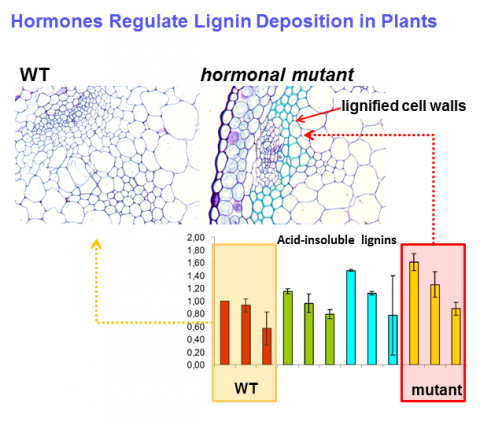Targeted modification of plant biomass properties
INTRODUCTION:
Plants biomass could serve as an important self-renewable source of natural polymers. Technologies allowing modifications of biomass composition are of high industrial importance. Lignin is the second most abundant organic polymer on Earth useful in a number of applications ranging from production of ship diesel until valuable chemicals.
TECHNOLOGY (INVENTION) DESCRIPTION:
We found that via targeted modification of proteins involved in signaling or biosynthesis of plant hormones cytokinins, it is possible to change the amount of lignin in the plant biomass. We discovered that cytokinins act as important regulators of the developmental pathway leading to the secondary cell wall (CW) formation. This process is of high economic importance, as the CW-derived biomaterials are widely exploited in diverse human activities relating to food, fibers, textiles, paper and building materials. In terms of more advanced technologies, plant CWs form the bulk of the lignocellulosic biomass in prospective 2nd generation bioenergy crops. Thus, manipulation of cytokinin signaling could be an important target in our efforts for production of biomass with specific properties.
ADVANTAGES OVER EXISTING SOLUTIONS:
Increasing the lignin content can improve the energy value of the plant biomass dedicated for heat production via burning. Lignin pyrolysis allows production of ship diesel with low sulfur content. However, the most promising is using of lignin in valuable chemical production useful as e.g. natural binders, dispersant and adhesives, concrete admixtures, automotive industry materials, food or fragrance industry (vanillin, the world-wide mostly used flavor could be produced from lignin). By generating the biomass with improved lignin content, we could increase the effectiveness of the whole process leading to lignin extraction.
DEVELOPMENT STATUS (STAGE):
The result at the level of fundamental research in the model plant Arabidopsis thaliana. Further development necessary.
PUBLICATIONS:
Didi V, Jackson P, & Hejatko J (2015) Hormonal regulation of secondary cell wall formation. Journal of Experimental Botany 66(16):5015-5027
IP PROTECTION STATUS:
The way of influencing lignification in plants. Czech Patent No. 306073. In CRaTUoBCV Masaryk University (Brno, Canada)
TECHNOLOGY / IP OWNERS :
Masaryk University (Brno, Czech Republic) and The University of British Columbia (Vancouver, Canada). Hejatko J, Didi V, Vasickova J, Mansfield SD.

More information
More information is available upon signing a CDA / NDA (Confidential Disclosure Agreement / Non-Disclosure Agreement)